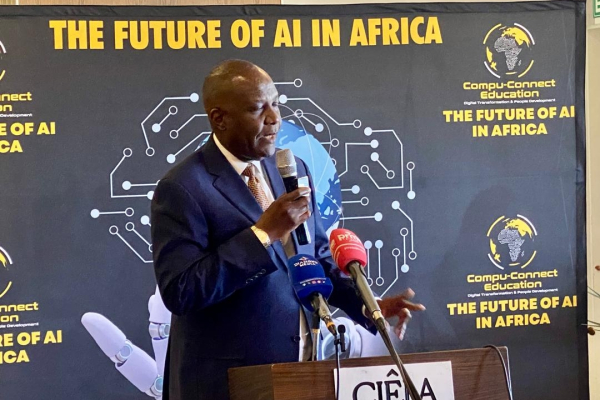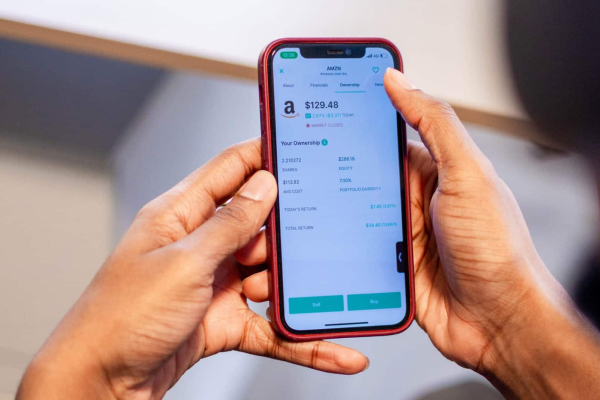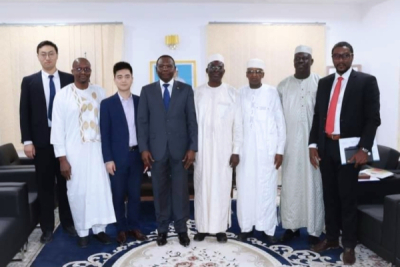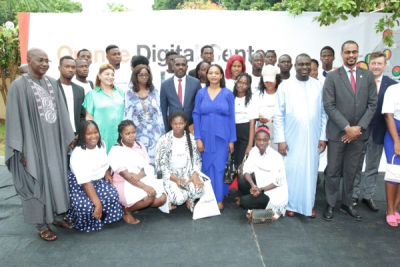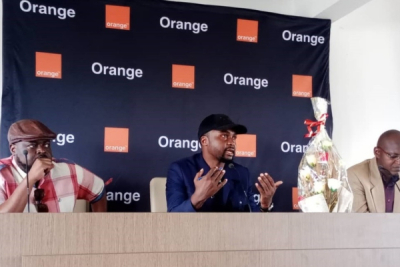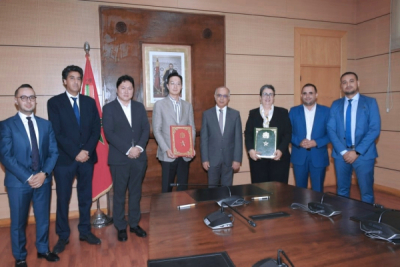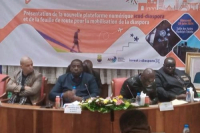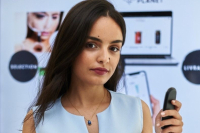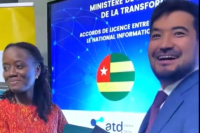The Zambian government has begun developing an artificial intelligence (AI) framework, Minister of Science and Technology, Felix Mutati announced on June 27. To this end, the government is collaborating with the Tony Blair Institute to develop an AI strategy.
With this announcement, Zambia joins a select group of African nations that are embracing AI technology.
Bamboo, the Nigerian investment app that allows users to invest in US stocks, has expanded its operations to South Africa.
Bamboo’s entry into South Africa aims to capitalize on the country’s growing interest in international investments and digital financial services. The company’s expansion is expected to boost the African fintech sector and contribute to economic development.
The Chadian government has recently revived its efforts to drive digital transformation in the country. The selection of strategic partners will be critical to achieving the ambitious goals laid out in its new digital development strategy.
Chinese technology company Huawei has expressed its commitment to supporting Chad in realizing its digital projects. On Friday, June 28, Prime Minister Allah-Maye Halina received a delegation from Huawei Technologies led by its director in Chad, Feng Guo Jeremy.
The discussions focused primarily on digital projects and the improvement of information and communication technologies (ICT) in Chad. Huawei has offered to assist the government in achieving its technological development goals.
The delegation's visit comes nearly a year after the signing of a memorandum of understanding between the Chadian government and Huawei during Huawei Connect 2023. Under this agreement, Huawei committed to becoming a key partner of the Chadian government and to assist in building an ecosystem conducive to the growth of digital talents in Chad.
The support from Huawei is expected to significantly advance Chad's digital projects included in the new government's program. These projects encompass the improvement of digital infrastructure, the integration of digital technologies in the educational system, the digitization of government services, and technological innovation.
Chad currently lags significantly in the digital sector. According to DataReportal, the country had 3.2 million internet users in January 2023, representing an internet penetration rate of 17.9%. During the same period, the number of mobile phone users was 11.5 million, with a mobile penetration rate of 63.9%.
Samira Njoya
Orange continues to expand its Orange Digital Center network across the continent. Following launches in Dakar, Senegal; Bamako, Mali; Conakry, Guinea; and Freetown, Sierra Leone, Bissau, the capital of Guinea-Bissau, is now set to inaugurate this ecosystem dedicated to developing digital skills.
Orange, a leading telecom operator in Africa, has inaugurated the Orange Digital Center in Guinea-Bissau on June 28, 2024. The center, located in the capital Bissau, aims to train young people in digital skills, enhance their employability, and encourage innovative entrepreneurship.
The Orange Digital Center in Guinea-Bissau is part of a network of 26 similar centers across Africa, the Middle East, and Europe. It includes a coding school, a solidarity FabLab, a startup accelerator "Orange Fab," and is supported by Orange Ventures Africa, the group's investment fund dedicated to promising startups.
"This space is more than just a technological center; it is a promise of transformation and growth for the digital future of Guinea-Bissau and Africa. By providing free access to cutting-edge resources, we hope to inspire a new generation of creators and leaders, and contribute to an inclusive digital economy," said Brelotte Ba, Deputy CEO of Orange Africa and the Middle East.
The establishment of the Orange Digital Center in Guinea-Bissau aligns with the French telecom operator's strategy to position itself as a leader in digital transformation on the African continent. According to a World Bank report published in September 2022, the Bissau-Guinean government is committed to strengthening the country's digital skills, despite lacking the capacity to invest in the necessary resources. The absence of a national information and communication technology policy and strategy makes achieving several sustainable development goals by 2030 uncertain. Programs like Orange's help mitigate the issue while awaiting public authority actions.
Access to digital skills can improve access to basic public goods and services (e-government, telehealth, etc.), local financial services (online banking, digital payments, etc.), and promote better use of public information and digital platforms. It can also support an inclusive digital economy and contribute to the continuity of education by providing better access to distance or technology-assisted learning. As of early 2024, the internet penetration rate in Guinea-Bissau was 31.6%, according to DataReportal.
Adoni Conrad Quenum
Music holds a prominent place in Cameroon's cultural sector. Recognizing this significance, Orange has introduced initiatives to support industry stakeholders.
Orange Cameroon has relaunched its Orange Music Legends program in partnership with Cameroonian music legends. The telecommunications company announced this on Wednesday, June 26, during a press conference. This initiative aims to support and promote new musical talents across various genres.
This year, five iconic duos will be formed, each consisting of a legendary artist and a leading artist of the new generation. Together, they will revisit great hits that have resonated with multiple generations of music lovers. The event will take place on Wednesday, July 3, at the Yaoundé Multipurpose Sports Complex (Paposy).
Entrance tickets are free and can be downloaded via the Max it app, which provides access to Orange's services. The app is available on the Play Store and App Store. To download the super app Max it, click on "Marketplace," then "Event & Ticket." Select your ticket type: a free classic ticket or a VIP ticket (5,000 CFA Francs, or €7.61) for closer access to the stage. Complete your purchase and download your ticket.
Season 2 of the program promises to be even more spectacular with 24 episodes over 13 weeks, compared to 12 episodes previously. Additionally, games and quizzes will offer prizes totaling 5 million CFA Francs. The winning duo will receive 10 million CFA Francs. All votes will be cast via the Max it super app.
This initiative not only celebrates Cameroon's rich musical heritage but also supports the new generation of artists by providing them with a platform to gain recognition and collaborate with iconic figures in Cameroonian music. Alongside promoting local culture and talent, Orange Cameroon continues to innovate by offering practical digital solutions for its customers, thus reinforcing its commitment to digital transformation and support for the country's creative industries.
Samira Njoya
Across Africa, the job market is increasingly requiring individuals with strong digital knowledge and capabilities. As a result, it has become imperative to provide training to a large number of people in this critical field.
Samsung Electronics Maghreb Arab (SEMAG), the Moroccan subsidiary of the Korean technology giant Samsung, announced on Wednesday, June 26, the signing of a partnership with the Ministry of National Education, Preschool, and Sports. This initiative aims to expand their collaboration on the "Samsung Innovation Campus" (SIC) program, which promotes digital education in Morocco.
As part of this new collaboration, the SIC program will be extended to all secondary school computer science teachers for training and certification in Python programming. Additionally, the first national programming competition will be launched to encourage excellence and innovation in Python among Moroccan students.
According to the government, this partnership aligns with the objectives of the 2022-2026 Information and Communication Technology roadmap, which aims to equip teachers and students with essential skills to thrive in the digital age. For Samsung, the initiative is part of its global corporate social responsibility (CSR) strategy, which seeks to provide young people with the opportunity to learn crucial technologies and gain skills to improve their career prospects.
Since the program's launch in 2019, over 10,000 students have acquired coding skills thanks to 211 teachers across nine centers equipped with more than 500 computers and televisions. A total of 562 teachers have been trained and certified in Python programming.
This partnership brings Morocco closer to achieving the goals of the African Union's Digital Education Strategy, which advocates for the promotion of digital skills among teachers and students. The strategy also aims for at least 20% of students and 50% of teachers on the African continent to have access to digital devices by 2027, with a target of one-third of students and all teachers by 2030.
Samira Njoya
She enables Algerians to sell and buy fairly used fashion clothing and accessories online. For her solution, she has received several awards and recognitions.
Amina Djebbar is an Algerian entrepreneur and a graduate of the University of Algiers, where she earned a degree in Arabic-French-English translation in 2006. She is the founder of Vandista, an online second-hand fashion marketplace.
Launched in 2020, Vandista allows users to buy and sell second-hand fashion clothing and accessories. It offers fast and secure delivery through delivery partners and pickup points. Payments can be made by credit card, upon delivery, or using the balance from sales.
For every order, Vandista provides protection that allows for returns in case of defects or non-compliance. The startup has over 72 pickup points and offers more than 15,000 items for sale.
Before launching Vandista, Amina Djebbar founded Evens Factory Algérie in 2018, a company specializing in professional event management. Four years later, she created Women's Business Agency, another event management agency specializing in teambuilding events, renting and creating customized booths, and designing games and activities for trade shows and exhibitions.
After her studies, she worked as a commercial attaché at CFAO in Algeria starting in 2007, a company operating in the sectors of mobility, health, consumer goods, infrastructure, and energy in Africa. In 2009, she joined Emploitic.com, a recruitment platform, as a key account manager.
In 2017, she became responsible for talent acquisition and HR projects at Société Générale de Surveillance (SGS). Between 2021 and 2022, she worked as the marketing and sales director at the Center for Psychological Research and Application (CRAP).
Amina Djebbar has received several awards and distinctions. In 2023, her platform Vandista won the best mobile application award at the CTO Forum Algeria. She received the special Ooredoo prize as part of the national MACHROU3I competition dedicated to women entrepreneurs. In 2024, she won the first prize in the third edition of the Annual Women's Entrepreneur Challenge organized by the public startup accelerator Algeria Venture.
Melchior Koba
The initiative aims to facilitate investments from members of the Cameroonian diaspora in their hometown and encourage economic contributions from Cameroonians living abroad, fostering development and growth in Douala
The Urban Community of Douala (CUD), the Douala's municipal government, unveiled its digital platform, icud-diaspora, on Wednesday, June 26, following the establishment of a framework for exchanges with the diaspora in December 2022. This initiative aims to encourage Cameroonians living abroad to invest in the country's economic capital.
"We took the time to analyze key insights, such as the unanimously expressed demand from our diaspora to establish digital bridges to better harness opportunities in Cameroon. Through this platform, we want to offer skills, networks, and relationships that will enable our diaspora to invest in Douala and help us meet the city's social demands," explained Douala's mayor, Roger Mbassa Ndine.
The icud-diaspora platform allows Cameroonian migrants to declare their projects for Douala with just a few clicks and propose their expertise. In return, the city government promises to offer public-private partnerships (PPP), a dedicated remote contact person, project assistance, online services, a network of approved providers, and land availability.
According to a diaspora consultation conducted by the CUD between June and August 2023, 72% of the 445 respondents are willing to invest if conditions are met, 49% desire a dedicated intermediary to facilitate their projects, and 81% prioritize the quality and reliability of information. The consultation identified main barriers to diaspora engagement, including economic, social, and political conditions, bureaucracy, lack of incentives, and a deficit of trust and knowledge about opportunities.
Currently, the CUD offers a dozen opportunities to the diaspora in infrastructure and urban planning, such as developing residential or commercial real estate projects, constructing and operating supermarkets, among others. Roger Mbassa Ndine emphasized, "It's about co-constructing Douala's development with Cameroonians abroad who are a strength for our country."
Remittances from the diaspora are significant for the national economy. According to the World Bank, remittances from Cameroonian migrants to their home country amounted to $365 million in 2022, an increase of about 5% compared to $350 million in 2021. Douala aims to leverage these funds to drive its development.
Frédéric Nonos
After finishing her education, she decided to apply her knowledge and skills to help the people of Tunisia. Today, she is an entrepreneur who operates an e-commerce website selling local, healthy, and environmentally friendly products.
Fatma Midani (photo), a Tunisian entrepreneur, is the co-founder and CEO of Soul & Planet, a platform that connects local producers with customers seeking healthy and eco-friendly products. Founded in 2020, Soul & Planet is a tech platform that markets ecological products in Tunisia.
Initially focused on individuals, Soul & Planet quickly diversified to include businesses, helping them improve their environmental and social footprint by influencing their employees' consumption habits. "Soul & Planet's principle is to buy and resell healthy and eco-friendly products (food, cosmetics, decor) through e-commerce. It's important to note that we developed our community before selling the products. This allowed us to accurately identify and meet our customers' needs. Favoring short supply chains, our suppliers mainly come from Tunisia," explains Midani.
The products available on the platform are designed to save water, reduce CO2 emissions, improve consumer health, support the local economy, and create jobs within micro and small enterprises. Soul & Planet is also a partner of the Tunisian government for reforestation projects.
In 2021, Midani co-founded Ceos Club, a knowledge-sharing and managerial resource hub for entrepreneurs, founders, and business leaders. She graduated from the Higher Institute of Fine Arts of Tunis with a bachelor's degree in product design in 2015 and holds a master's degree in product design from Sapienza University of Rome, obtained in 2019. Before venturing into entrepreneurship, she worked as a UX designer at Conte.it, an Italian brand of the Admiral Group, from 2018 to 2019.
Melchior Koba
In July 2022, Togo set a goal to digitize 75% of its administrative procedures by 2025.
Togo and Kazakhstan are strengthening their cooperation in the digitalization of public services. Togo's government agency, Togo Digital Agency (ATD), has formed a strategic partnership with Kazakhstan's National Information Technologies (NITEC). According to Togo First, this partnership will enable ATD to leverage NITEC's resources and expertise for its digital projects.
"This partnership will allow ATD to benefit from NITEC's expertise on various subjects to accelerate the digitalization of public services and administrations," stated the Togolese agency.
This initiative is part of the efforts to strengthen diplomatic relations between the two countries, particularly following President Faure Gnassingbé's visit to Kazakhstan. NITEC, ranked 28th on the E-Government Development Index and 8th on the UN's Online Services Index, is expected to bring its expertise to Togo, helping the country deploy advanced technologies to improve its public services.
It is worth noting that Togo aims to digitalize 75% of its public services by 2030.
Ayi Renaud Dossavi
More...
The Democratic Republic of Congo (DRC) government is working to improve the country's telecommunications infrastructure and expand access to telecom services nationwide. In March 2023, a 620 km fiber optic cable connecting Kinshasa and Muanda was inaugurated
The SOCOF SA, Congolese Fiber Optic Company, has signed a partnership agreement with the Agency for Coordination and Monitoring of Collaboration Agreements (APCSC) to deploy fiber optics along roads throughout the Democratic Republic of Congo (DRC). The one-year collaboration, which is renewable, is part of the Congolese government's efforts to use digital technology as a driver for integration, good governance, economic growth, and social progress.
According to Freddy-David Lukaso, the special advisor to the president on posts, telecommunications, and ICT, the government has convinced various entities responsible for transport infrastructure to include fiber optic "information highways" in their projects. SOCOF has been tasked with managing the deployment of these data infrastructures by APCSC.
In March 2023, a 620 km fiber optic route between Kinshasa and Muanda was inaugurated to strengthen the national ICT infrastructure. The government is also working to operationalize a universal service fund to connect every Congolese citizen "wherever they are" within the national territory.
The project aims to improve the population's access to telecommunications services and digital services more broadly. As of the third quarter of 2023, the DRC had 28.9 million mobile internet subscribers, with a penetration rate of 30.4%. The number of mobile phone subscribers stood at 56.1 million.
Isaac K. Kassouwi
The Smart Africa Alliance was founded in 2013 by seven African heads of state. Today, the organization includes forty member countries, more than fifty private sector members, and is expanding its strategic partnerships.
KaiOS Technologies, a Chinese tech company, has joined the Smart Africa Alliance, a political initiative aimed at promoting digital development in Africa. The partnership aims to accelerate digital innovation and foster sustainable development across the African continent, as announced in a press release published on Wednesday, June 26.
The collaboration ensures that previously unconnected citizens gain access to essential digital services such as messaging, news, entertainment, and education through affordable and reliable KaiOS-powered smart feature phones with internet access. Additionally, the partnership empowers businesses by distributing affordable merchant payment terminals leveraging KaiOS smart feature phone technologies, enabling underserved merchants to accept digital payments and manage their businesses efficiently.
This initiative is part of the Smart Africa project, whose primary goal is to create a single digital market in Africa by 2030. Supported by 40 African countries and several major international organizations, the alliance is multiplying partnerships to achieve this objective. In October 2023, it partnered with Orange Middle East and Africa to promote entrepreneurship and sustainable jobs for young people in Africa in the digital sector. Earlier in 2023, the pan-African organization teamed up with Amazon Web Services to equip young Africans with digital skills.
Internet usage in Africa has increased from 16% in 2013 to 37% in 2023, while the global average is 67%, according to data from the International Telecommunication Union. Regarding digital payments, mobile money leads the continent, generating $44.9 billion in transaction volume, valued at $836.5 billion. This amount represents 66.39% of the $1.26 trillion exchanged via mobile money services worldwide in 2022, according to the "State of the Industry Report on Mobile Money 2023" by the Global System for Mobile Communications Association (GSMA).
Adoni Conrad Quenum
He works in the technology and logistics industries. Through his company Ezee Market, he seeks to transform e-commerce and assist small and medium-sized enterprises (SMEs) in optimizing their efforts for increased profitability
Eric Hage (photo) is a seasoned Liberian entrepreneur with extensive experience in business development. He is the co-founder and CEO of Ezee Market, a tech-driven retail startup that supports small and medium-sized enterprises (SMEs).
Founded in 2019, Ezee Market is an online platform that brings together various local retailers, supermarkets, shopping centers, restaurants, bars, pizzerias, ice cream shops, and small entrepreneurs. Users can purchase a wide range of products, including electronics, smartphones, food items, computers, fashion accessories, jewelry, and much more.
The startup facilitates easy shopping and home delivery, enabling users to communicate with friends and sellers, make smooth payments via credit card or mobile payment services, and track their orders in real time.
Before launching Ezee Market, Eric Hage founded United Logistic Company in 2016, a transport solutions provider where he served as CEO until 2022. He holds a Master’s degree in Business Administration from Cuttington University, Liberia, obtained in 2011.
His career began in 2003 at Acres of Hope, a non-profit organization dedicated to helping vulnerable people in Liberia, where he held positions as Program Manager and National Director. In 2009, he became Logistics Procurement Manager at Liberia Commodities and Logistics, an organization specializing in the trade of basic commodities. From 2012 to 2016, he worked as a Development Specialist for the United States Agency for International Development (USAID).
Melchior Koba
Founded by two tech entrepreneurs, the solutions aims to make it healthcare access easier for people. It integrates an AI-based chatbot to make the process even smoother.
La Ruche Health, an Ivorian startup, has developed an e-health platform that allows users to book appointments online through an AI-powered instant messaging chatbot. The Abidjan-based startup was launched in 2023 by Benjamin Sasu and Rory Assandey.
The platform has a mobile app accessible on both iOS and Android, which has already been downloaded more than 500 times from the PlayStore. Users can register to access various services, such as teleconsultation and home medical exams. After booking an appointment, users can discuss their symptoms with a qualified specialist within 60 minutes, and they will receive their prescriptions instantly through the mobile app.
In addition to the web and mobile platforms, La Ruche Health has Kiko, an AI-based chatbot with which users can chat on WhatsApp. This conversational agent is capable of conducting medical discussions and answering simple or complex technical questions. It understands messages via voice note, text, and images. The startup claims more than 150,000 "patient encounters" led by the chatbot, with only 2.33% converted into appointments with doctors.
Prior to its official launch in 2023, the startup was selected in 2022, along with 14 other African startups, for the "Google for Startups Accelerator" program. In 2024, it was among the startups chosen by the Ivorian authorities to participate in the VivaTech technology fair held in Paris from May 22 to 25.
Adoni Conrad Quenum


